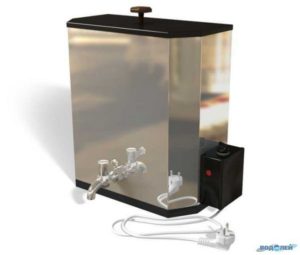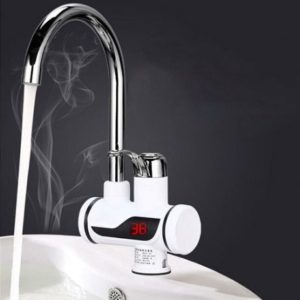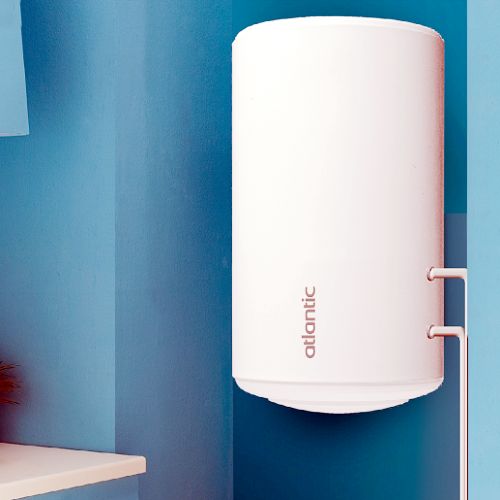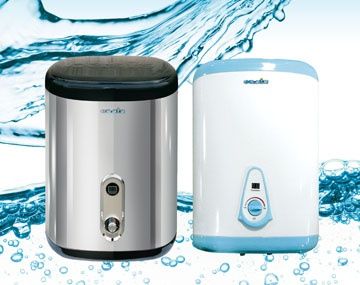Is a water heater beneficial or not?
 Every year there is a seasonal shutdown of hot water, which makes you think about purchasing heating equipment. A water heater is a good alternative; it always has hot water, but is it profitable or not to use it instead of a central water supply?
Every year there is a seasonal shutdown of hot water, which makes you think about purchasing heating equipment. A water heater is a good alternative; it always has hot water, but is it profitable or not to use it instead of a central water supply?
The content of the article
Advantages and disadvantages of using a water heater
Pros:
- High efficiency. The drive uses 1.5-3 kW per hour, not working on a permanent basis. Good thermal insulation of the tank retains heat for a long time.
- Possibility to set the heating at night. Very convenient when the nightly cost of electricity is low.
- Access to hot water at any time of the year, regardless of repairs and other work with central water supply.
- The output water is free of impurities, sand and rust.
Minuses:
- If there is no electricity, there is no hot water.
- Duration of the first heating.
- Limited tank volume.
- Service. The boiler should be periodically descaled and the magnesium anode replaced.
- Quite an expensive repair.
The service life of electric heaters depends on the price category and proper use.
IMPORTANT! When thinking about purchasing a boiler, remember that your electricity bills will increase!
Types of electric heaters
 Depending on the type of heating, devices can be either flow-through or storage.
Depending on the type of heating, devices can be either flow-through or storage.
Advantages of instantaneous water heaters:
- Fast heating.
- Electricity is used only when fluid passes through the apparatus.
Equipment of this type can only increase the temperature by one constant value. This is impractical in winter, when the cold water temperature is approximately 7 ° C. The average power is from 5 to 12 kW.
Advantages of storage water heaters
- Water is always at the set temperature;
- High efficiency;
- Low power that even weak electrical wiring can withstand.
Flaws:
- Long heating time;
- Large dimensions;
- Electricity costs for heat conservation.
Pros and cons of central hot water supply
 Advantages:
Advantages:
- No restrictions on the use of cubes.
- Payment by meter, only for the volumes used.
- The utility service is in charge of troubleshooting.
Flaws:
- Annual preventive maintenance.
- Long wait for problems to be fixed.
- Rising prices for utilities.
Calculate the cost of using utility hot water and boiler
To compare savings with each method, calculations should be made.
At the time of writing, prices in Moscow are as follows:
- Hot — 188.53 rub. for 1 m3.
- Cold — 38.06 rub. for 1 m3.
- Electricity – 5.38 rubles. for 1 kW.
On average, a person spends 3.5 cubic meters of hot water per month. For a month of using it from the network, under the above conditions, he will pay:
3.5 × 188.53 = 659.86 rubles.
When using a water heater, for the same 3.5 cubic meters, but at the price of a cold one, it will be:
3.5 × 36.08 = 126.28 rubles.
You can pay for electricity using the savings.
 Taking for example a device with a 50-liter tank with an electricity consumption for heating of such a volume equal to 1.52 kW per hour. A person who uses 3.5 m3 of hot water per month spends approximately 70 liters per day on washing dishes, taking a shower and other needs. Accordingly, the daily electricity consumption is:
Taking for example a device with a 50-liter tank with an electricity consumption for heating of such a volume equal to 1.52 kW per hour. A person who uses 3.5 m3 of hot water per month spends approximately 70 liters per day on washing dishes, taking a shower and other needs. Accordingly, the daily electricity consumption is:
70×1.52 = 106.4 kW.
With the device constantly running, to maintain the temperature, the daily consumption will be an additional 34.2 kW. As a result: 140.6 kW per month.
The monthly payment for electricity will be:
155.8 × 5.38 = 756.43 rubles.
If you heat the water as needed and then turn off the device, you can avoid the cost of maintaining the temperature. With this option, the cost will be 572.4 rubles per month.
What is more profitable to use
IMPORTANT! Calculations show that there is NO benefit from using an electric heater on an ongoing basis, and when used sparingly, it is insignificant. Purchase and installation costs were not included in the calculation.
With a constant hot water supply, there is no need to purchase a water heater. It is important to remember that the device costs a considerable amount, and also requires the service of an installer.
It is definitely worth installing a water heater for convenience and constant access to hot water, and not for savings.





